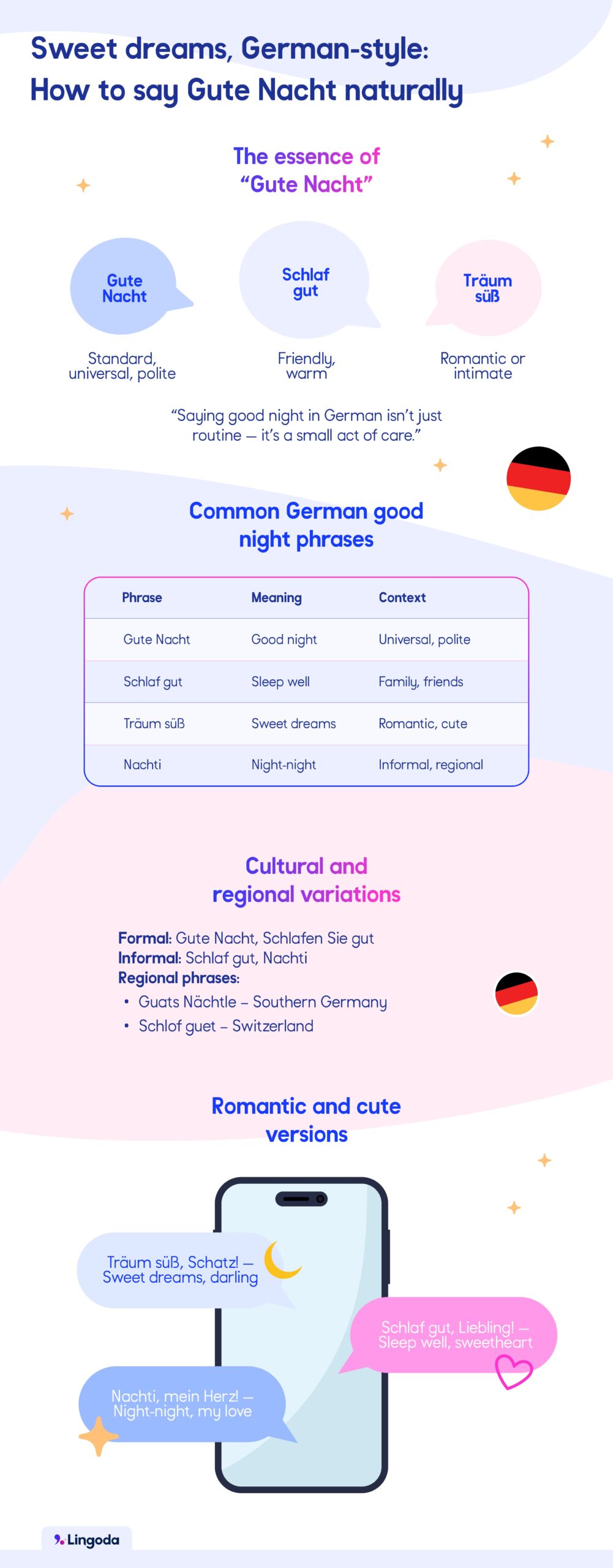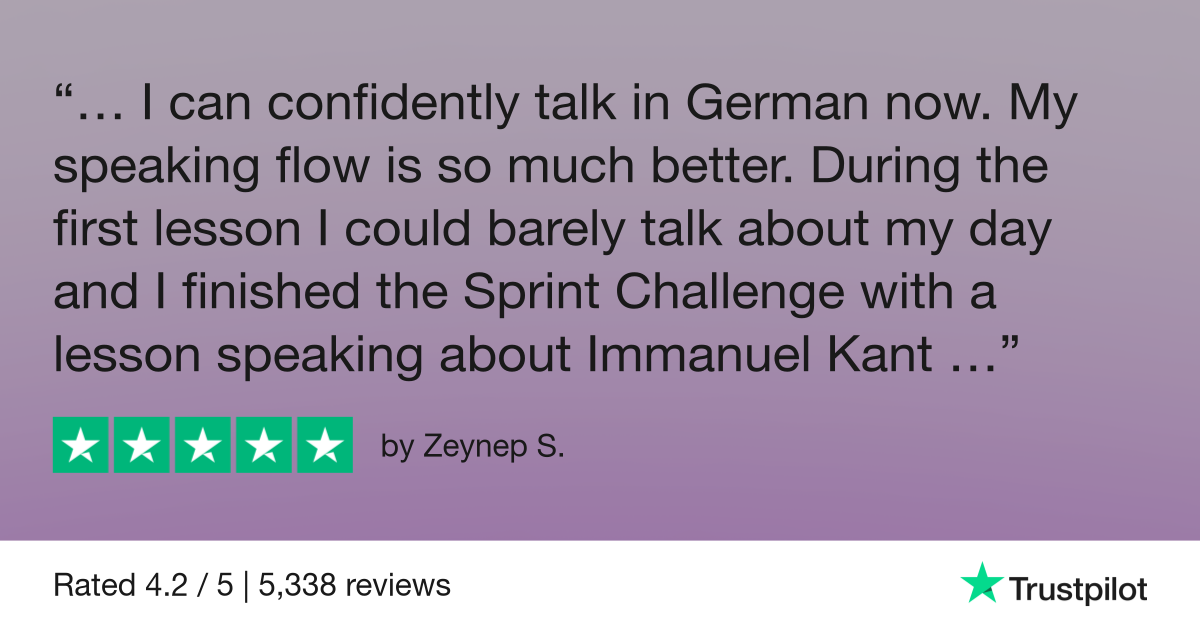Sweet dreams, German-style: How to say good night in German
TL;DR:
Gute Nacht is the standard way to say good night in German.You can also say Schlaf gut (“sleep well”) or Träum süß (“sweet dreams”) in friendly or romantic settings. Use Gute Nacht in formal contexts and Nachti or Träum was Schönes in close or regional ones.

When you’re learning German, even small phrases can make you sound instantly more natural — and none are as warm and universal as good night. Saying Gute Nacht in German isn’t just about ending the day; it’s about showing care, affection, or simple politeness in a way that feels authentically German.
In this guide, we’ll walk you through the most common, romantic, and cultural ways to wish someone a good night — from everyday phrases to cute bedtime farewells. You’ll also learn when to use each one (and how not to sound like a textbook).
- Common ways to say good night in German
- Romantic and cute variations
- Cultural context – how Germans say good night
- FAQs
Common ways to say good night in German
Use Gute Nacht in most situations; Schlaf gut and Träum süß add a cozy touch.
| Phrase | Meaning | Context |
| Gute Nacht | Good night | Universal, polite |
| Schlaf gut | Sleep well | Family/friends |
| Träum süß | Sweet dreams | Romantic/cute |
| Nachti | Night-night | Informal/childlike |
Gute Nacht
You can never go wrong with Gute Nacht. It’s the German version of “good night” — short, polite, and perfect for almost any situation. Say it to your roommate, your colleague after a late meeting, or even your host family in Germany. It’s a great basic German phrase for beginners to practice.
Gute Nacht! Schlaf gut.
(Good night! Sleep well.)
It’s neutral and safe, but still warm like the linguistic equivalent of a friendly wave before bedtime.
Schlaf gut
If Gute Nacht is the polite handshake, Schlaf gut is the cozy hug. It literally means “sleep well,” and you’ll hear it between friends, partners, or family. Germans love a bit of understatement, so instead of big emotions, they’ll quietly wish you a restful sleep.
Schlaf gut, Mama. Bis morgen!
(Sleep well, Mom. See you tomorrow!)
You can think of it as the phrase that says “I care about you” — but without actually saying it.
Träum süß
Now, if you really want to turn up the warmth, try Träum süß, which means “sweet dreams.” It’s cute, a bit flirty, and perfect for texts or late-night messages to someone you’re close to.
Träum süß, mein Schatz.
(Sweet dreams, my darling.)
You might also hear variations like Schlaf schön (“sleep nicely”), Träum was Schönes (“dream something nice”), or Nachti — a sweet, childlike version that’s popular among friends and families.
Tip: Want to pick up expressions like these naturally? Learn German them from native-level teachers at Lingoda, where bedtime phrases sound as real as they do in Germany.

Romantic and cute variations
Sometimes, saying good night in German isn’t just polite; it’s adorable.
How do you say it sweetly?
If you want to say something like “sweet good night,” you’d use Träum süß or Träum was Schönes. They both carry a loving, playful tone. Add a nickname and you’ve got the perfect bedtime message:
- Träum süß, Schatz! — Sweet dreams, darling!
- Schlaf gut, Liebling! — Sleep well, sweetheart!
- Nachti, mein Herz! — Night-night, my love!
It’s the kind of good night that makes someone smile before they turn off the light.
Just remember — Germans don’t overdo sweetness. Keep it natural, not overly romantic.
Cultural context – how Germans say good night
Polite vs. informal situations
Germans adjust their bedtime phrases depending on how well they know you. If you’re with a colleague or acquaintance, Gute Nacht or Schlafen Sie gut (“sleep well,” formal version) is perfect.
Among friends or family, switch to Schlaf gut or the casual Nachti. It’s a subtle way to show closeness, a tiny signal that you’re on friendly terms.
If you’re unsure when to use du or Sie, don’t worry — you’re not alone. As a rule of thumb: use Sie in professional or polite contexts and du with friends, family or anyone who’s invited you to be less formal.
Regional differences
Not every German good night sounds the same. Travel around the country and you’ll hear fun German dialects like:
| Phrase | Meaning | Region |
| Guats Nächtle | Good night | Southern Germany (Swabian/Bavarian) |
| Schlof guet | Sleep well | Switzerland |
| Gute Nacht | Good night | Standard everywhere |
If you ever hear Guats Nächtle, you’ve probably made it to Bavaria and earned a smile for trying.
How do you say “good night” sweetly?
You can say Träum süß or Träum was Schönes. Both mean “sweet dreams” and are common between friends, partners, and even parents and children.
Is it „guten Nacht“ or „gute Nacht“?
It’s Gute Nacht — no “n”! Since Nacht is feminine in German, the adjective takes the -e ending. (If grammar makes you sleepy, you’re not alone.)
Is „Gute Nacht“ correct?
Absolutely. Gute Nacht is the standard phrase in all German-speaking regions. You can use it any time you’re saying goodbye at night.
Wie wünscht man auf Deutsch eine gute Nacht?
Say Gute Nacht to keep it simple, or add warmth with Schlaf gut or Träum süß. These are everyday ways to wish someone a peaceful night.
Gute Nacht with confidence
Learning how to say Gute Nacht in German is one of those small wins that instantly makes your German feel more real. From a polite Gute Nacht to a heartfelt Träum süß, these phrases help you connect, no matter who you’re talking to.
Start using them today (and maybe test a Nachti or two).
For a deeper, more authentic experience, try Lingoda — where certified, native-level teachers make everyday German sound as natural as saying “good night.”

Learn German with Lingoda
How it works

We use AI tools to support idea generation and drafting. Every article is edited by our editorial team to ensure accuracy, clarity, and quality.
















